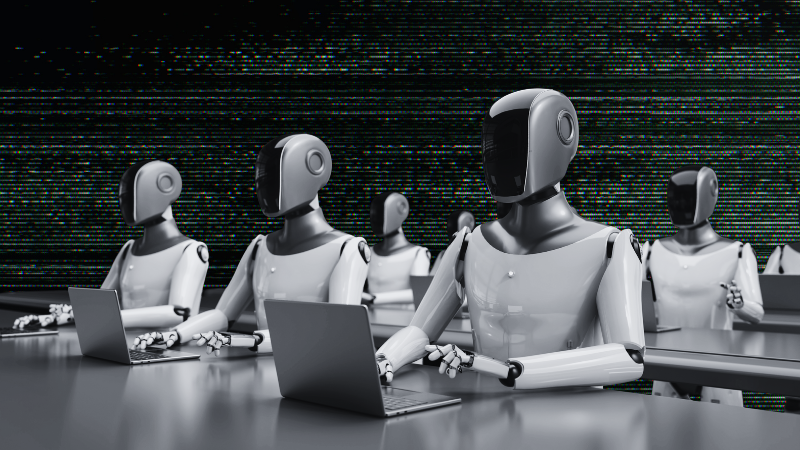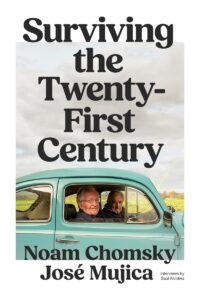
Noam Chomsky and José Mujica on the Double Edged Sword of Automation
“Automation is wonderful as a technique; the problem is who controls the technology.”
In Surviving the Twenty-First Century, two world-renowned figures of contemporary politics come together to discuss timeless topics and debate alternatives for the future: José “Pepe” Mujica, former president of Uruguay and an ex-guerrilla whose message of sustainability and common sense won him an international following, and Noam Chomsky, who revolutionized linguistics and has become a beacon for radical thinking around the world.
From their meeting emerged reflections on the major global issues of our time: climate change, corruption, populism, the crisis of capitalism, and the logic of the market economy, among many others. Brought together by filmmaker Saúl Alvídrez, these two radical elders share passion, politics, and wisdom.
Here, they discuss the social concerns inherent in an age of automation.
*
Noam Chomsky: There is a big challenge for the left in the years ahead: automation. Automation is already taking over much of the boring, stupid and dangerous work that people do. This should free people to undertake truly creative and satisfying work. Understanding automation and working to create the conditions where workers can benefit from technical advances is an important task for the twenty-first century.
Saúl Alvídrez: Pepe, what problems do you see with automation?
José Mujica: The most serious problem is that robots can replace humans in many, many things, but robots work only for their masters! And what of people who do not own robots? The problem is not automation. Automation is wonderful as a technique; the problem is who controls the technology. Policies that allow redistribution are going to be needed. The owners of the robots will have to contribute much more. This has already become part of conversations around various basic-income proposals.
Noam Chomsky: Indeed, these are not simply problems of automation, they are problems for society. And the task of the left is to create a society in which the negative impacts of technology are mitigated. Technology as such is a neutral thing, just like a hammer: you can use it to smash somebody’s head, or you can use it to build a house. The hammer doesn’t care. It’s the same with automation. You can use it in the way you are describing in a capitalist society, or you can use it to free people to do the independent, creative work that motivates them, to eliminate boring, dangerous and routine tasks. Automation can go in either of these directions; that’s why the task of the left is to create social and cultural conditions in which the benign and constructive aspects of technology and automation are primary.
Technology as such is a neutral thing, just like a hammer: you can use it to smash somebody’s head, or you can use it to build a house.
This is a social problem, not a technological one, and technology can be a savior. For example, in ecological matters, the only way to solve the problem is to continue advancing technologically. Solar panels, for example, can make a big difference in sustainable energy generation, and so can wind power. One of the important aspects of solar technology is that it can be a distributed system and not centralized, and this is important. Energy companies are always trying to avoid using it because it impacts their profits, since anyone can add their own solar panels to their home. I think we should move in that direction.
So, automation can be used to destroy labor or workers’ power, but it can also be used in the opposite direction. This is not a new problem, and we must be aware of what has happened in the past. The most meticulous work on this subject was carried out by David Noble, a historian of technology.
In the 1960s Noble studied what he called “computerized numerical control,” which refers to the different ways of controlling machines by means of computers, something very relevant today. There are alternative ways of designing technology: One is to decentralize machine design and put it in the hands of skilled mechanics, and another direction is to put that power in the hands of centralized corporate power. There were reasons to go one way or the other, but we now know that the option that has prevailed is to put all the power in the hands of corporations.
José Mujica: Will it be the market and its hierarchs or humanity that defines the future? This is the question. We must start by understanding that we are part of the balance of life, and that in reality the key is to maintain ecosystemic balance. It is very likely that fifty years from now there will be people whose organs will be replaced, reproduced or imprinted with their own tissue, and that that person will be able to live for 150 or 200 years.
I would like a humanity that cares for all creatures equally.
It is very probable, but in any case, it will be for those who have a lot of money, and that will be one of the greatest injustices that humanity has seen, because this advance will not be for everyone but just for a privileged few. For the first time it will be possible to buy many years of life with money.
I don’t like this future for humanity. I would like a humanity that cares for all creatures equally. If artificial intelligence or automation suddenly has capabilities that help us to manage ourselves better, let’s explore that, but it’s tragic when those opportunities pass through the filter of what fills the pockets of a few. I welcome advances in the economy and technology, if their purpose is to create and multiply human happiness. Otherwise, there is the possibility of a disastrous world, and we may see a kind of dictatorship that the Earth has never seen before.
Saúl Alvídrez: Is it important, especially for young people, to push for legislation before this problem overtakes us? The advance of technology will continue to be exponential, and the threats of technological disruption are imminent.
José Mujica: Automation and artificial intelligence are not in and of themselves problems. The problem is who manages these technologies and what use they are put to. Are these technologies in the interest of a minority or in the interest of humanity?
This is at the bottom a moral question, a philosophical question of how we fight for change, and the answer will depend on the ability of humans to face this, because the laws that are complied with are only those that have human backing and are enforced. The cemetery of good but dead laws is infinite; the main thing is that social forces exist.
That is why young people have to learn that they have to get together with like-minded people and fight, fight with great heart and intelligence and give people a cause to live for. After all, what is the destiny of young people today: to grow old paying bills, to confuse happiness with buying a new thing and having another new thing later, and so on until they are old?
It is worth fighting for a better world where societies can influence these fundamental issues. We have ahead of us an opportunity to shorten the working day. We have ahead of us infinite chapters of struggle in which people must not only think of themselves but think of others as well.
__________________________________

From Surviving the Twenty-First Century by Saúl Alvídrez, Noam Chomsky and José Mujica. Used with the permission of the publisher, Verso Books. Copyright © 2025 by Saúl Alvídrez, Noam Chomsky and José Mujica.
Noam Chomsky, José Mujica, and Saúl Alvídrez
Noam Chomsky is Institute Professor Emeritus at the Massachusetts Institute of Technology, Laureate Professor at the University of Arizona, and the author of more than one hundred books. José Mujica was a Tupamaros guerrilla during the Uruguayan dictatorship. He spent almost fifteen years in prison. He served as the fortieth president of Uruguay from 2010 to 2015. Saúl Alvídrez is a Mexican activist and the founder of #YoSoy132, which in 2012 became the largest student movement in Mexico’s history. He is also a filmmaker. His debut documentary, Chomsky and Mujica, will be released in 2026.



















